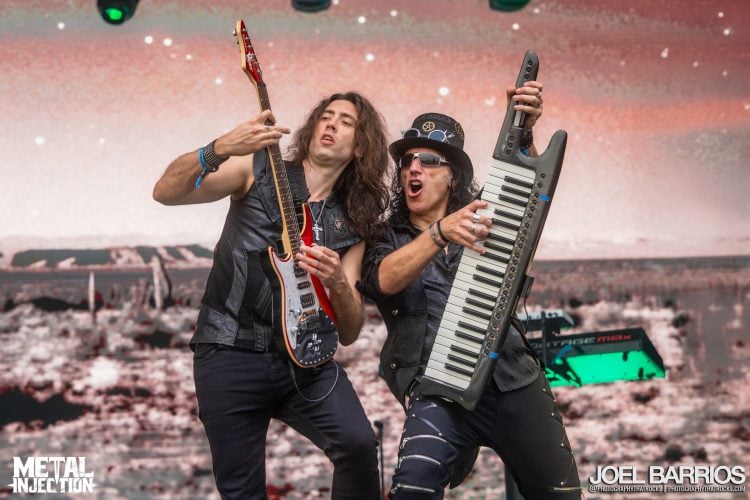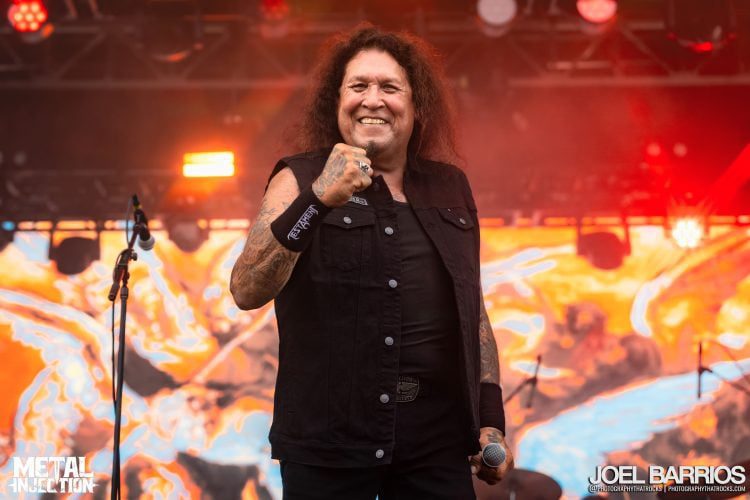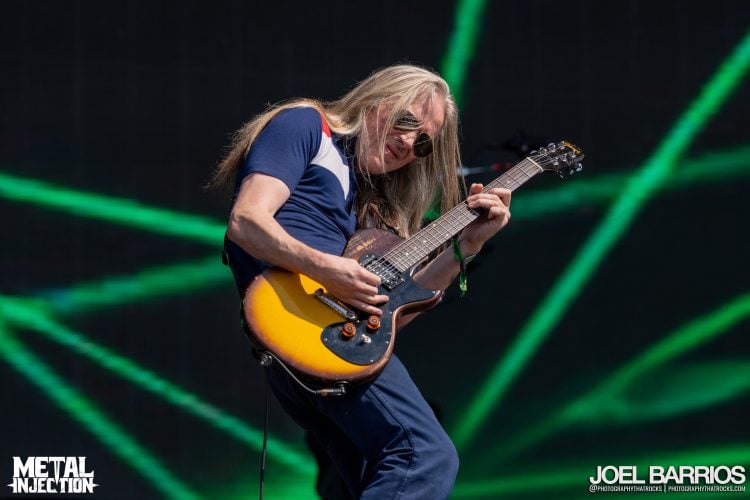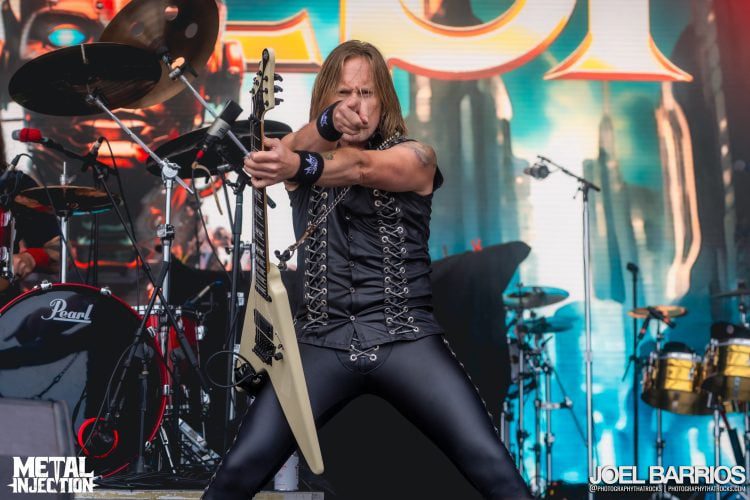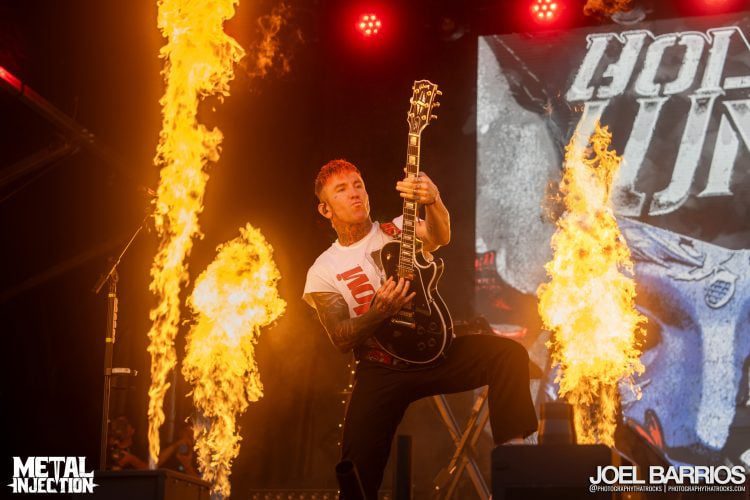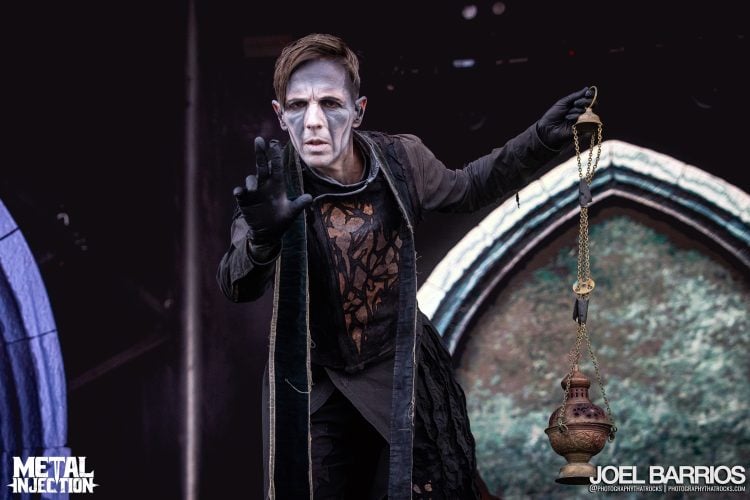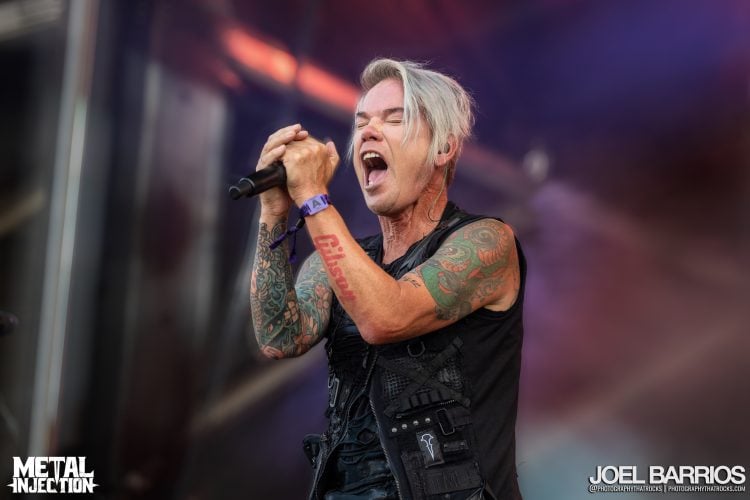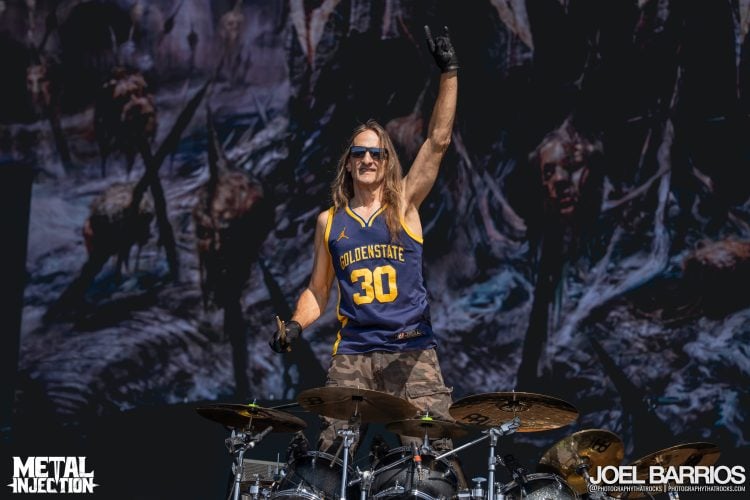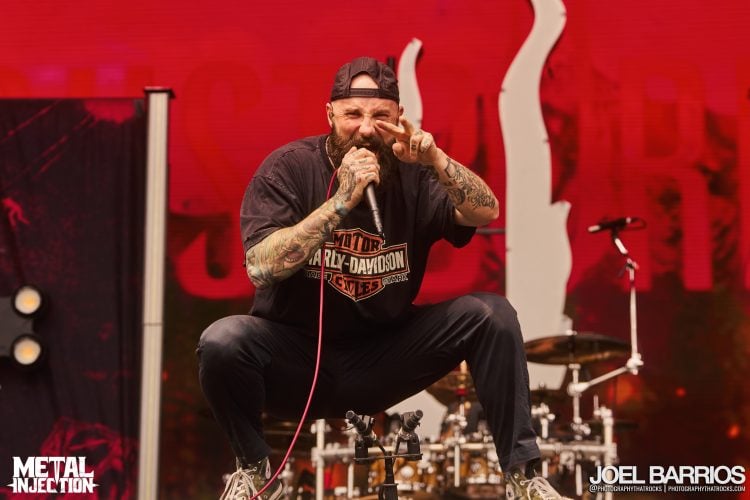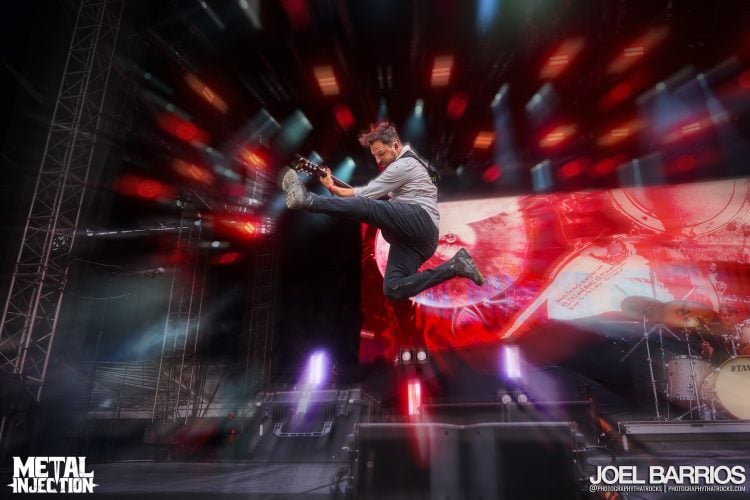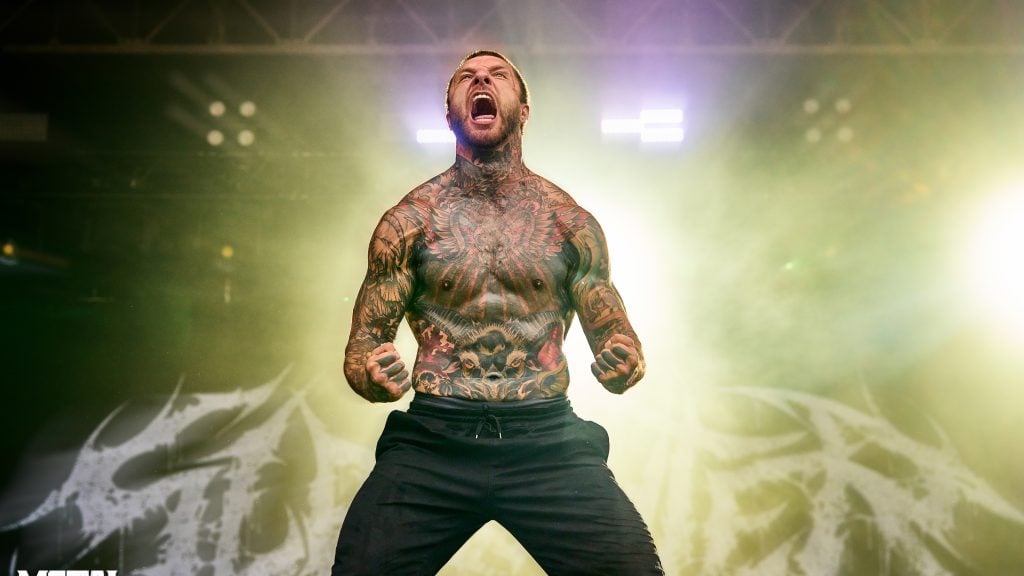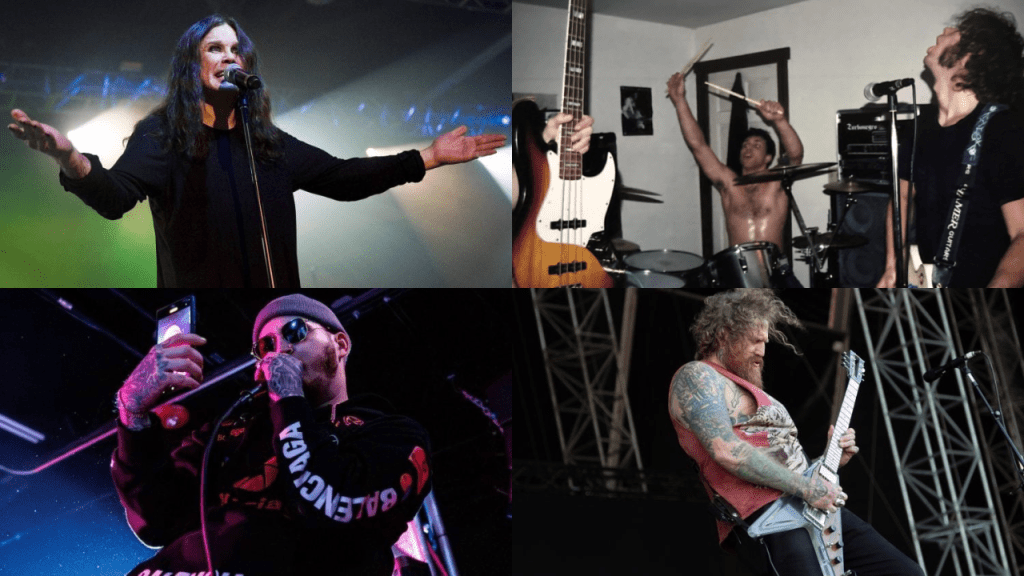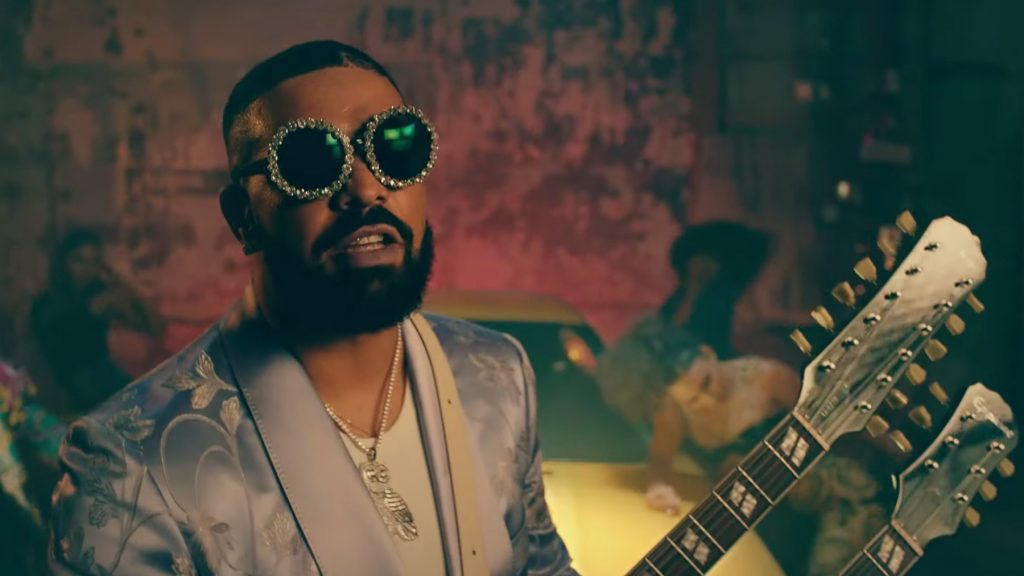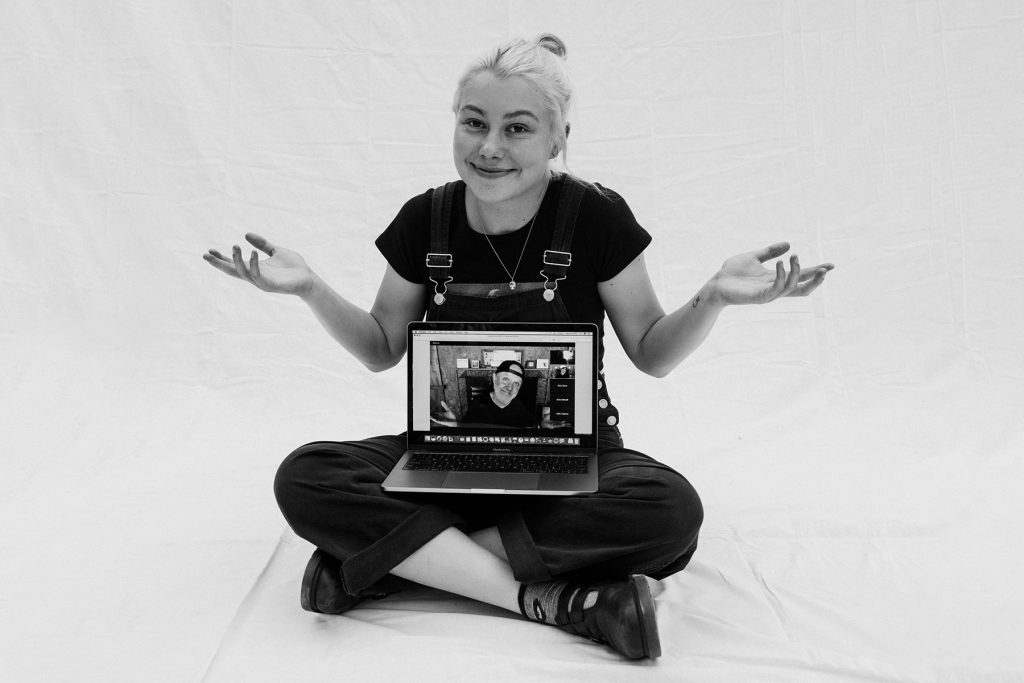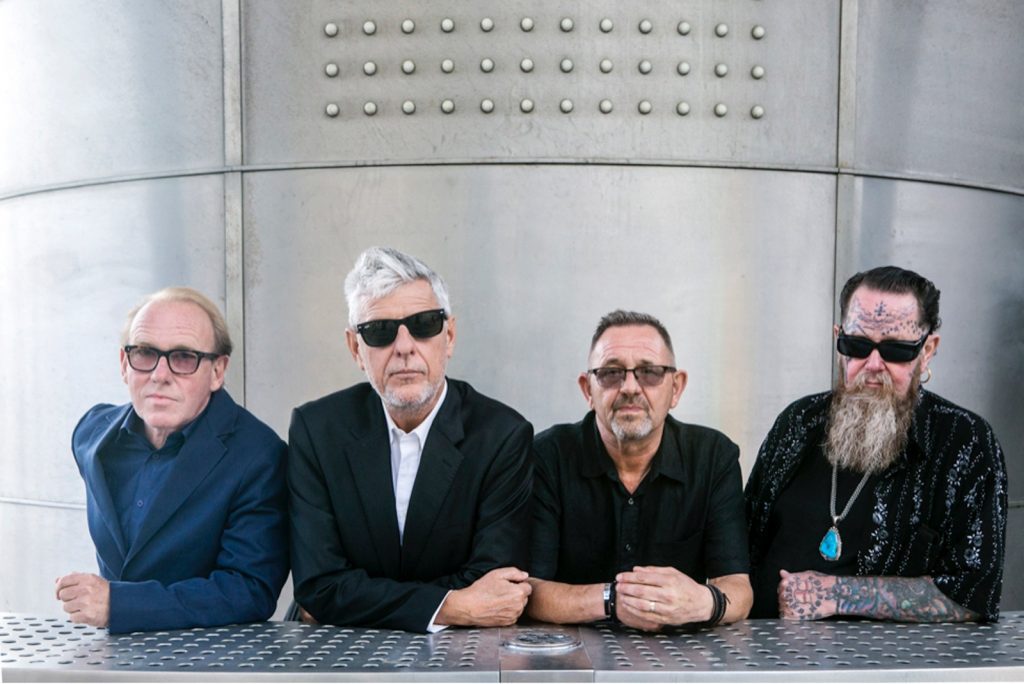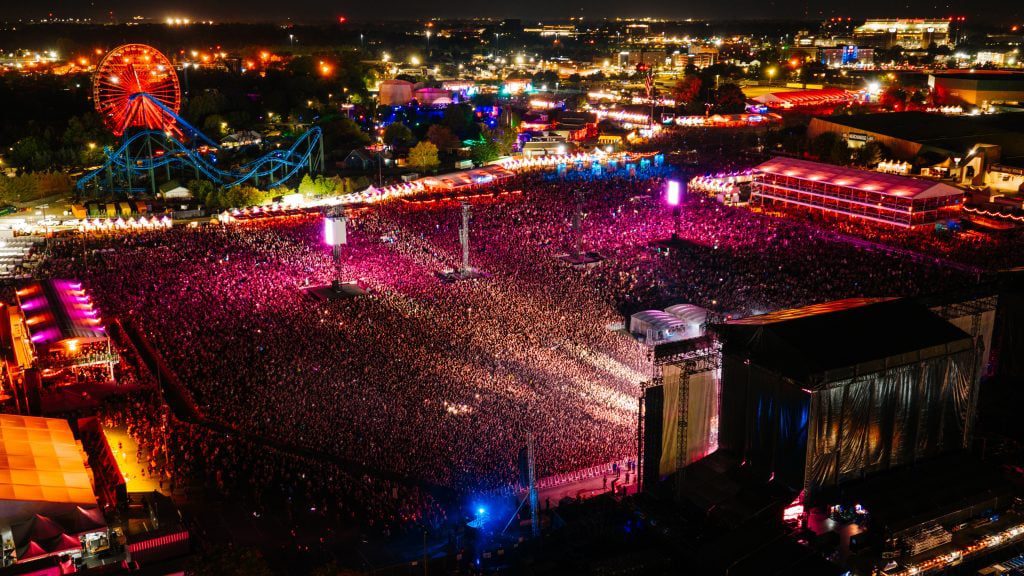
Louder Than Life 2025 Recap: Metal Music’s Largest Gathering In America Gets Bigger & Heavier
With attendance numbers projected to be near a quarter million and more than 175 bands scheduled across seven stages at the Kentucky Exposition Center in Louisville over four days, Louder Than Life has now crossed into cultural phenomenon territory with its 2025 edition. Celebrating its 11th year, the event encountered some challenges — from unseasonably warm temperatures to occasional thunderstorms, which caused some cancellations — yet what unfolded from September 18th through 21st was an unforgettable musical spectacle, one with an especially heavy emphasis on metal compared to previous years.
Across the four days, death metal frequently dominated the early hours, with The Black Dahlia Murder delivering an eight-song lesson in feral intensity despite the punishing sun. Brian Eschbach, now firmly in the role of frontman after Trevor Strnad’s tragic passing, carried the weight of the band’s legacy with strength and conviction. His raw screams on “Funeral Thirst” and “What A Horrible Night To Have A Curse” were sharpened by Wes Hauch’s searing fretwork, a perfect counterpart to the chaos that unfolded onstage. When “Deathmask Divine” closed the set, the air felt scorched, as if the very sun above Louisville had been harnessed by the Detroit crew.
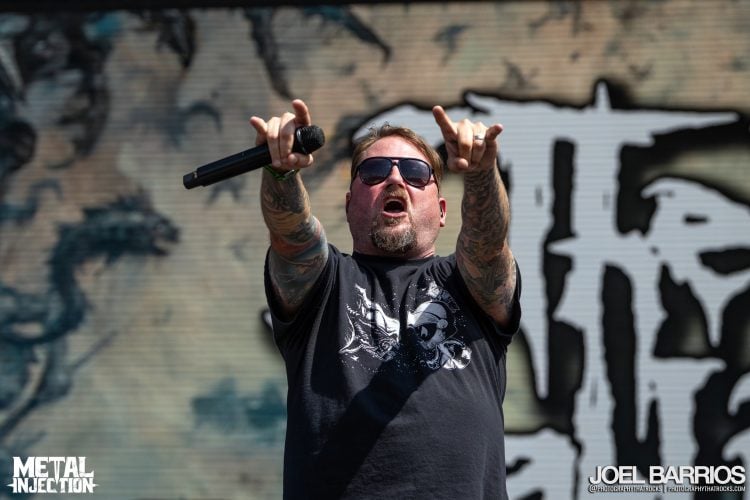
Veterans of the extreme genre, like Carcass and Cannibal Corpse, brought their own trademark sounds to join the implacable ferocity. Jeff Walker’s sardonic snarls and Bill Steer’s jagged riffs collided in a set that balanced gore and groove in equal measure. Classics like “Corporal Jigsore Quandary” and “Incarnated Solvent Abuse” ripped through the afternoon heat, while newer songs such as “Unfit For Human Consumption” drew younger fans into the pit. Daniel Wilding’s drums cracked like artillery fire, and Nippy Blackford prowled the stage with his guitar slung low, matching every blast beat with his own unruly energy. Cannibal Corpse tore through their set with relentless brutality, opening with “Blood Blind” and driving headlong into a barrage of classics like “Evisceration Plague” and “Unleashing the Bloodthirsty.” The crowd was whipped into a frenzy as the band’s trademark precision and savagery collided on stage, with every breakdown and blast beat hitting like a sledgehammer.
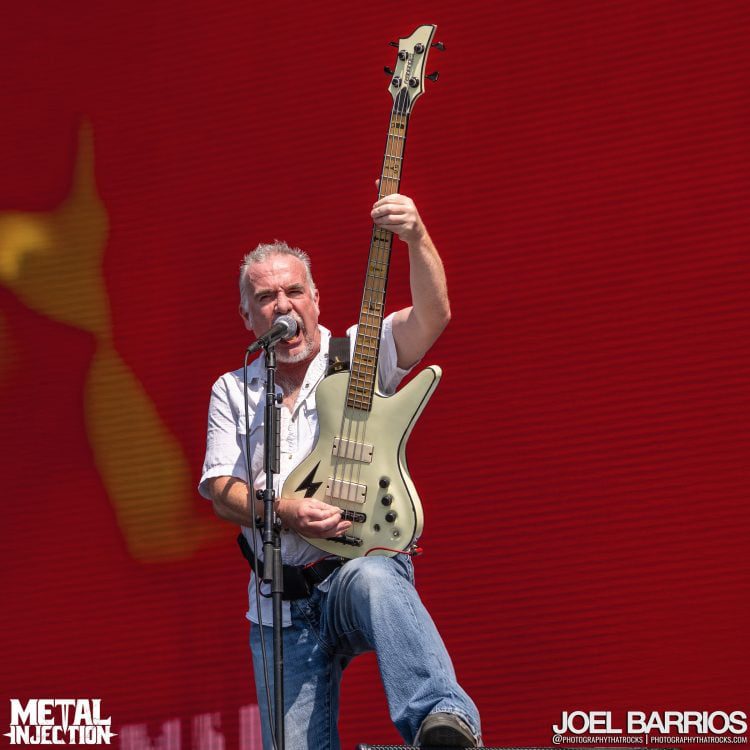
Thrash metal was also strongly represented, first with Exodus, who summoned the Bay Area spirit with an unflinching six-song assault. The return of Rob Dukes, replacing longtime frontman Zetro Souza, sparked debate among fans but quickly silenced doubters. Dukes’ growl matched seamlessly with staples like “A Lesson In Violence” and “The Toxic Waltz,” as well as newer crushers like “Blacklist” and “Deathamphetamine.” Gary Holt and Lee Altus’ riffs, supported by bassist Jack Gibson and drummer Tom Hunting, ensured unstoppable momentum. Cavalera Conspiracy turned Main Stage 1 into a monument of 90s groove-heavy chaos. Max and Iggor Cavalera, joined by Igor Amadeus Cavalera and Travis Stone, tore through instant classics like “Refuse/Resist,” “Biotech Is Godzilla,” and “Propaganda.”
The performance paid tribute to the Chaos A.D. era, shaking the festival grounds with the raw power those anthems carry since they first appeared on the album. Later during the weekend, Testament proved that age has only sharpened their steel. Chuck Billy’s guttural delivery filled the Reverb Stage with commanding dominance, his massive frame fueling circle pits during “Practice What You Preach” and “Into The Pit.” Alex Skolnick and Eric Peterson’s guitar wizardry elevated the set beyond mere nostalgia, especially when the punishing new track “Infanticide A.I.” pushed the energy into overdrive. By the time the last notes rang out, necks were sore, and the ground beneath Louisville had felt the stampede of thrash at its fiercest.
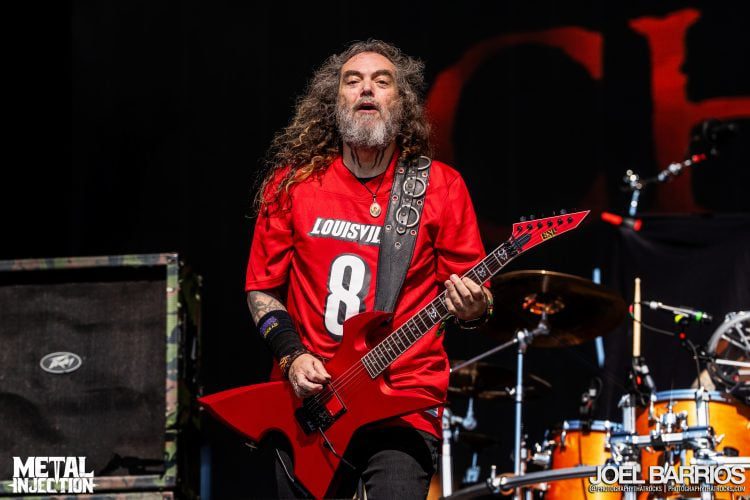
More modern torchbearers of heaviness also had their time to shine when Machine Head and Lamb Of God unleashed their brand of groove-infused thrash chaos. Machine Head opened with inflatable hammers tossed into the crowd, setting the tone for “Ten Ton Hammer,” which landed with all the weight its title promised. Robb Flynn’s roar carried across the field, his snarls cutting through a storm of riffs that culminated in the furious closer “Davidian.” Reece Scruggs, newly folded into the lineup, attacked his guitar with laser precision, while the pits below erupted like a tidal wave of bodies.
Lamb Of God, never satisfied with anything but “f*cking shit up,” turned Main Stage 1 into a battlefield of crowd-surfing chaos. Randy Blythe hurled himself across the stage, sweat pouring down his face, as “Resurrection Man,” “Walk With Me In Hell,” and “Ruin” detonated one after another like demolition hammers. Mark Morton and Willie Adler’s riffs carved out punishing grooves, while Art Cruz’s drumming thundered like heavy artillery. The atmosphere shifted into reverence when Blythe introduced their rendition of Black Sabbath’s “Children Of The Grave” as a tribute to Ozzy Osbourne, before dedicating their set-closing “Redneck” to Mastodon’s late guitarist Brent Hinds, a poignant and fiery conclusion.
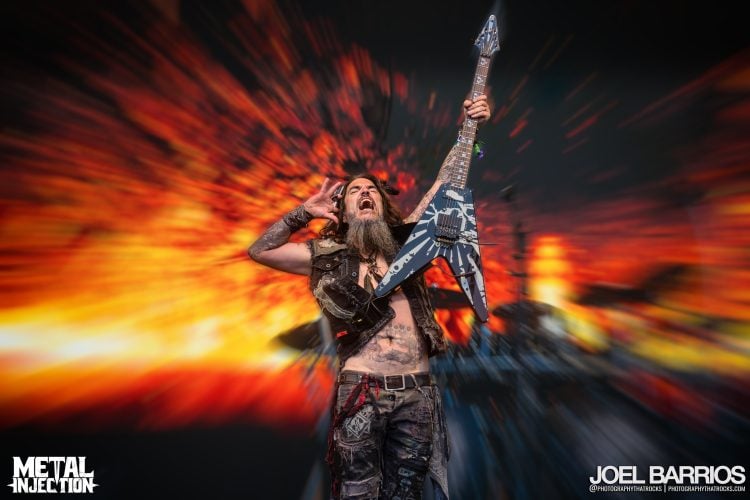
Louisville also became a swamp of heaviness with the arrival of Down, who conjured southern sludge like only they can. Phil Anselmo’s growl rolled like smoke over “Lifer” and “Stone The Crow,” Pepper Keenan and Kirk Windstein’s guitars locking into thick, swampy riffs that reverberated deep into the evening air. Jimmy Bower pounded his kit with primal ferocity, and Patrick Bruders’ bass added a seismic undertow. The crowd roared when System Of A Down’s Shavo Odadjian joined for “Temptation’s Wings,” the combined weight of their performance nearly cracking the concrete.
During Saturday afternoon, Acid Bath extended the Southern dirge into even darker territory, Dax Riggs channeling Ozzy’s spirit as he led the band through “Tranquilized” and “Bleed Me An Ocean.” With Sammy Duet and Mike Sanchez weaving riffs steeped in grime and Shane Wesley anchoring the low end, their set was a reminder why the NOLA scene has always thrived on atmosphere as much as heaviness.
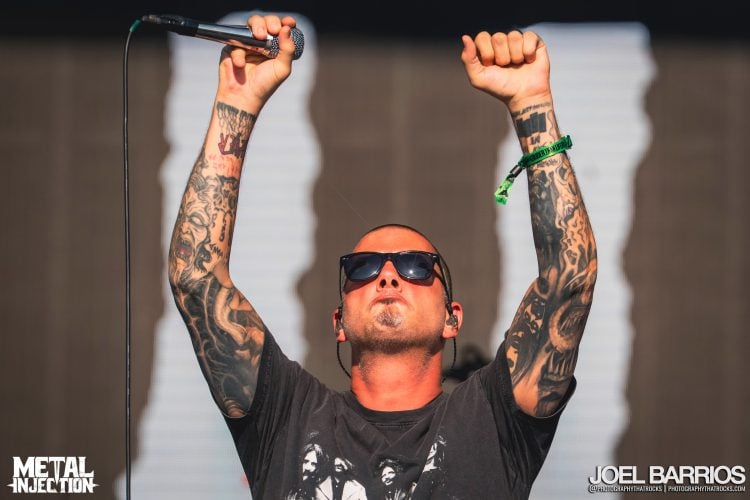
Industrial shock and theatrics arrived at the hand of Marilyn Manson, who turned Main Stage 2 into a carnival of light, smoke, and depravity. From “Disposable Teens” to “mObscene,” his set was equal parts grotesque spectacle and communal purge. The crowd howled every lyric of “Tourniquet” before being whipped into a frenzy during the back-to-back closer of “Sweet Dreams (Are Made Of This)” and “The Beautiful People.”
Earlier that day, Static-X had laid the groundwork, their mechanical riffs and Xer0’s futuristic presence driving “Pieces” and “Cold” into the afternoon sun, with “Push It” igniting a sweaty eruption of bodies. On the opposite side of the festival grounds, Stabbing Westward added a different shade of industrial angst, Christopher Hall throwing himself into every note of “Save Yourself” and “Shame,” his interactions with the crowd blurring the line between performer and participant. Their renditions of “Burn” and “Bizarre Love Triangle” were faithful yet revitalized, an inspired nod to their 90s heyday.
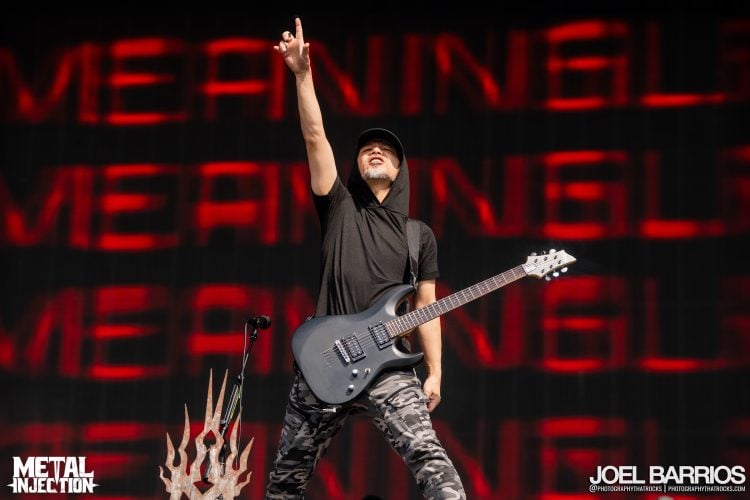
Cheers of utter elation might well have been heard in neighboring Tennessee as the opening samples of “Electric Head Pt. 1 (The Agony)” rang out in all its gothic glory, ushering in a performance of White Zombie’s heralded 1995 album Astro-Creep 2000 in its entirety by industrial pioneer Rob Zombie. The ensuing marathon of chugging riffs and static grooves, with the occasional ambient interlude, was accompanied by a dazzling visual display of lights, bathing the night sky in brilliant bursts of color as the crowd lifted its voice in unison to anthems like “Super-Charger Heaven,” “Creature Of The Wheel,” and “I, Zombie.” As expected, the most thunderous response came from the album’s most iconic chapter, “More Human Than Human,” with Mike Riggs egging the crowd on as he emulated Jay Noel Yuenger’s signature slide guitar riff.
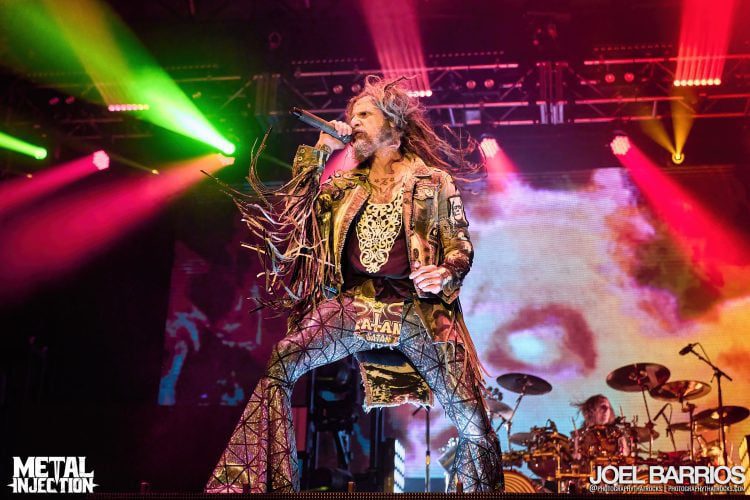
On the power metal front, Dragonforce and Powerwolf created a spectacle all their own, attracting flocks of fans to the Reverb Stage. Dragonforce unleashed a hyperactive storm of guitar theatrics, Herman Li and Sam Totman dueling at warp speed during “Fury Of The Storm” and “Through The Fire And Flames.” Between songs, they hurled plush chickens into the crowd, who gleefully tore them apart on command. Insane technical displays on an epic scale followed with a pair of older entries from their back catalog in “Fury Of The Storm” and the set-ending “Through The Fire And Flames,” though the pinnacle of this blend of saccharine melodic sweetness and hard partying came during their cover of Taylor Swift’s “Wildest Dreams,” performed in their usual reckless, warp-speed fashion.
Germany’s own Powerwolf — decked out in their usual blend of Transylvanian folklore-inspired makeup and liturgical garb — ramped up the gothic grandeur. Attila Dorn’s operatic voice led the masses through “Bless ’Em With The Blade,” “Armata Strigoi,” and “Fire And Forgive,” while the rest of the band burned the sweet incense of high-octane speed with an ecclesiastical twist. Falk Schlegel’s keyboard work added a cathedral-like atmosphere, while Matthew Greywolf and Markus Pohl’s guitars churned out tireless riffs. The apex of their set came when Robb Flynn reappeared to join Dorn for “Demons Are A Girl’s Best Friend,” the collaboration pushing countless hands and horns skyward.
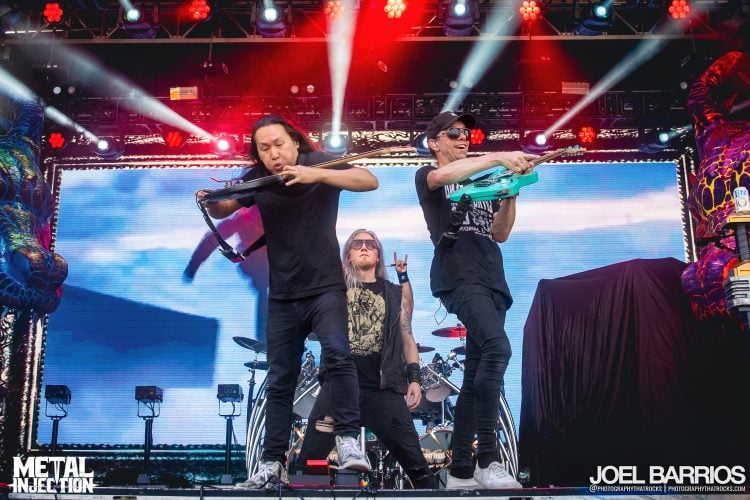
The resurgence of metalcore, hardcore, and nu-metal was one of the festival’s defining threads. Hatebreed lit the Loudmouth Stage ablaze, their brand of hardcore-inspired brutality opening with “I Will Be Heard” and escalating with “Tear It Down” and “Perseverance.” Jamey Jasta urged the crowd forward, surfers and bodies crashing over the barricade nonstop. As a frequent fixture of the DWP festival circuit, it might have been tempting to call what was dished out routine, yet it felt like anything but ordinary, regardless of how far from the stage one might have been.
Dressed in their signature emo attire and pulling no punches in the energy department, Black Veil Brides made the throngs below forget the heat and rage away to the riff-heavy blast of set opener “Knives And Pens,” kicking off an exciting nine-song run with little room for chitchat. Helmsman Andy Biersack was everywhere on the stage and seemed impervious to physical or vocal fatigue, screaming and singing his way through pounding anthems like “Faithless” and “Devil.” They even managed to slip in more polished numbers from their recent catalog, like “Bleeders” and a brand-new crusher dubbed “Hallelujah,” without losing a shred of enthusiasm from the sea of onlookers.
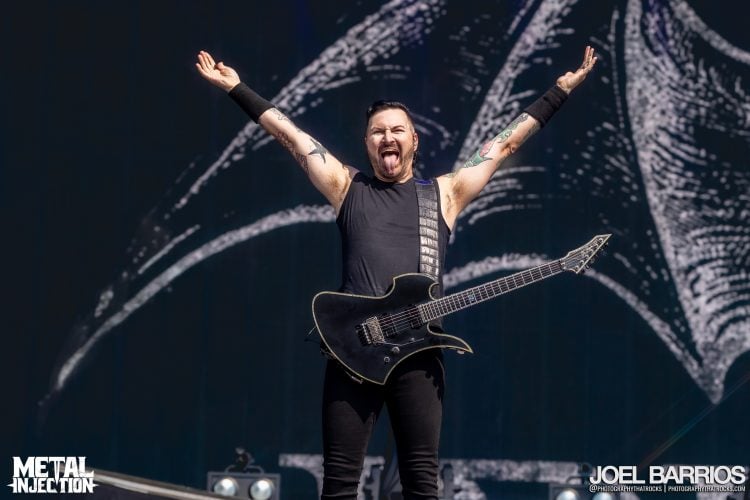
Theatrical metalcore mainstays with a gothic twist, Motionless In White, struck a dark chord in the sweltering open air of Louisville, clad in their signature midnight black attire and pale makeup as they graced Main Stage 2. Lead vocalist Chris “Motionless” Cerulli reprised his usual highly emotive and mobile presence, seizing most of the audience’s attention as he sang and screamed his way through melodic yet hard-hitting anthems like the industrial-tinged stomp of “Necessary Evil.” He was especially engaged during the closing renditions of “Eternally Yours” and “Another Life,” flanked by a metallic riff onslaught at either side from guitarists Ryan Sitkowski and Ricky “Horror” Olson, while bassist Justin Morrow anchored the low end with unwavering intensity.
Kittie took to the Reverb Stage and proceeded to rip the open air apart. The same unrestrained aggression that defined the early 2000s and fuels their present revival was on constant display as guitarist and frontwoman Morgan Lander shrieked and occasionally sang her way through riff-heavy bangers, supported by the massive rhythm section of her sister Mercedes Lander on drums, Ivana Jenkins on bass, and the intricate detailing of fellow guitarist Tara McLeod. Whether it was classic entries from their iconic debut Spit like “Brackish” and the title track “Spit,” or more modern blends of melody and mayhem like “Fire” and “Vultures,” this blast from two decades past was slaying with the best of them.
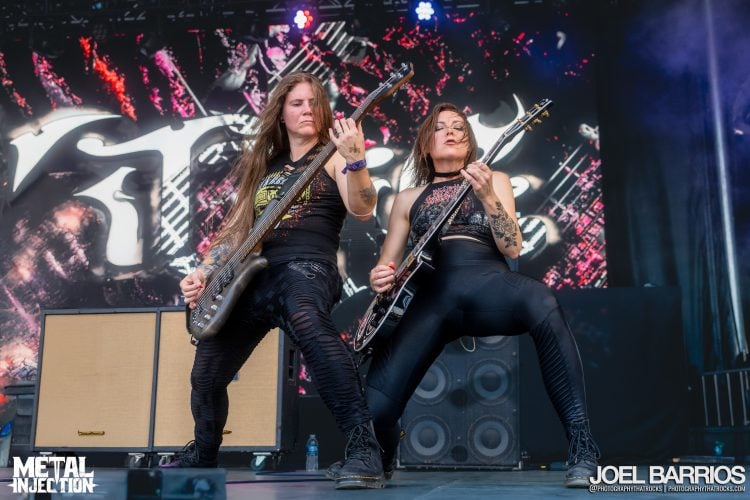
A similar throwback to the heyday of nu-metal with a subsequent metalcore evolution, Cleveland’s own Chimaira raised the volume something fierce at the appropriately named Decibel Stage, laying out pummeling grooves in peak 2000s form via classics like “Pure Hatred” and “The Flame.” Helmsman and screamer Mark Hunter rivaled Phil Anselmo at his rawest, while guitarists Rob Arnold and Matt DeVries tore into the open air with every riff, as keyboardist Chris Spicuzza added a quirky atmospheric edge. It all climaxed with a devastating performance of their signature closer “Power Trip,” transporting everyone in attendance back to 2003 in just over four minutes.
Nightfall was met with a blaze of lights, pyrotechnics, and adrenaline-charged riffing over at the Decibel Stage courtesy of Florida-born metalcore trailblazers Trivium. In contrast to some of the older guard of metal that devoted the lion’s share of their sets to one album or era, Matt Heafy and company touched upon nearly every record in their extensive repertoire within an eight-song run, blending Gothenburg-informed angst with technically charged fury to a tidal wave of moving bodies. Even as the ambience of “Capsizing the Sea” gave way to the crushing chords of “In Waves,” pandemonium seized the evening and only relented long enough for the crowd to catch breath and sing along to its ultra-infectious chorus.
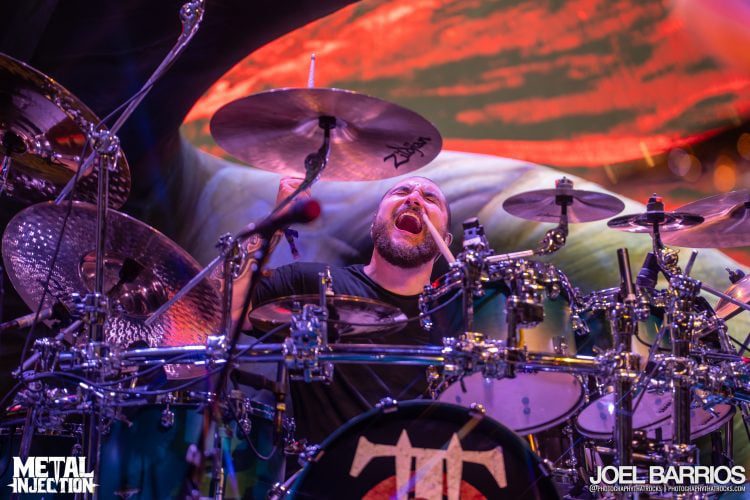
The momentum never flagged, with the mid-2000s nostalgia of “Like Light To The Flies” trading blows seamlessly with the progressive edge and thrashing character of newer entries like “The Sin And The Sentence” and the freshly unveiled “Bury Me With My Screams.” All the while, Heafy and fellow axe-man Corey Beaulieu delivered a masterclass in virtuosity and crowd engagement.
The progressive side of metal came alive with Dream Theater and Queensrÿche, who offered two distinct but equally immersive journeys. Dream Theater — making their Louder Than Life debut — delivered their highly eclectic and technically intricate brand of sonic craftsmanship, highlighted by the fairly recent return of original drummer Mike Portnoy and the release of their latest album, Parasomnia. One of its moderately long tracks, “Midnight Messiah,” was among the highlights. For their respective parts, virtuoso guitarist John Petrucci, keyboard wizard Jordan Rudess, bassist John Myung, and the aforementioned Portnoy breezed through their elaborate roles, making extended works like “The Enemy Inside” and “Peruvian Skies” (which featured segments of Pink Floyd’s “Wish You Were Here” and Metallica’s “Wherever I May Roam”) veritable feasts for the ears.
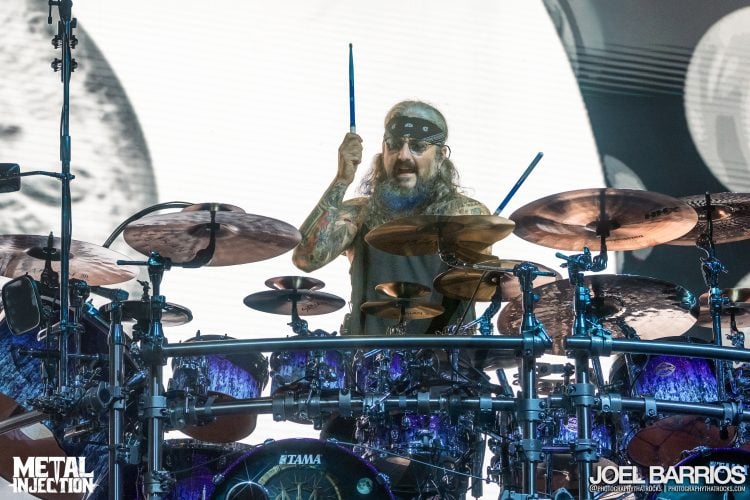
Sadly, the same could not be said for vocalist James LaBrie, who was under the weather during the performance and often leaned on Portnoy’s voice for support. Nevertheless, anyone at the event who had not previously experienced progressive metal staples like “Pull Me Under” and “As I Am” surely left wanting more.
A day later, the mastery of the old guard reached near critical mass, courtesy of Seattle progressive heavy metal pioneers Queensrÿche. Todd La Torre so effectively recreated the tone, character, and acrobatics of his predecessor — while injecting his own nuance and personality — that even the staunchest purists had little to complain about. Despite a shortened set caused by weather concerns, the explosive five-song performance included enduring classics like “Operation: Mindcrime” and “Empire,” which had the masses swaying and singing in unison. A brilliant rendition of “Take Hold Of The Flame” and “Queen Of The Reich” showcased La Torre’s astonishing vocal chops to the awe of everyone within earshot.
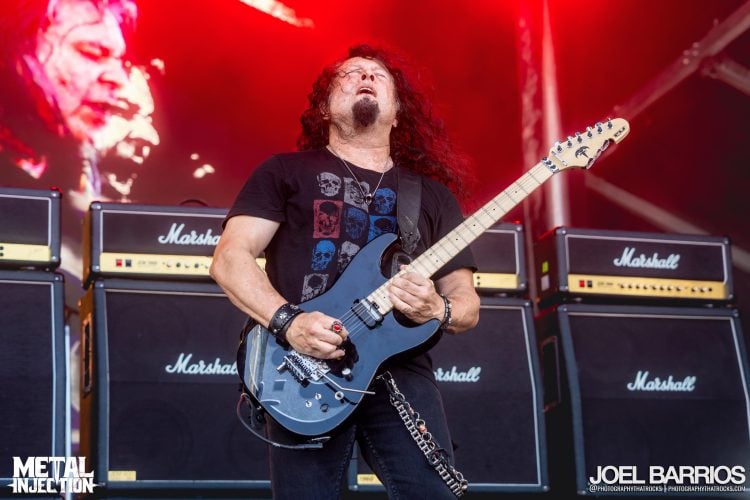
Industrial and alternative sounds also found space, with Stabbing Westward and A Perfect Circle each offering contrasting approaches. The full lineup of Stabbing Westward combined high-energy anthems with an animated stage presence, led by vocalist and co-founder Christopher Hall, whose theatrical movements — bobbing, weaving, even pausing to sign a CD for a fan at the barricade — captivated the audience. Whether it was the iconic 90s grit of “Save Yourself,” “What Do I Have To Do?” and the set-closing “Shame,” or their trademark covers of The Cure’s “Burn” and New Order’s “Bizarre Love Triangle,” the open-air stage became a house party without walls or roof.
The arrival of A Perfect Circle shifted dusk toward quirkiness. Their singular blend of influences was anchored by the emotive and commanding vocals of Tool’s own Maynard James Keenan, who steered the set like a ship’s captain, telegraphing each twist with voice and body alike. The opener, “The Package,” stretched nearly eight minutes and moved from subdued jazzy balladry to neurotic hard-rocking bursts, a vivid showcase for guitarists Billy Howerdel and James Iha, bassist Matt McJunkins, and drummer Josh Freese. More digestible yet still abstract pieces like “Blue” and “Weak And Powerless” pulled the audience deeper into their world, while heavier works like “The Doomed” and breakout hit “Judith” ultimately stole the show.
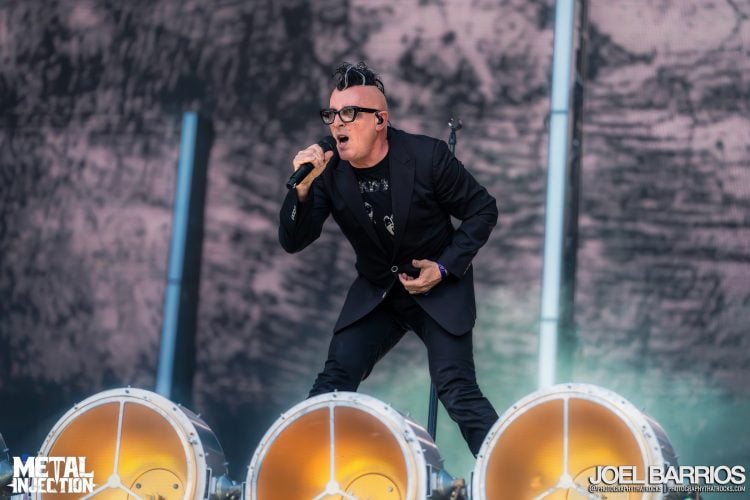
The veterans of heavy metal heritage had their moment in the spotlight with Accept, Sebastian Bach, and Bruce Dickinson. The lingering drizzle of Sunday afternoon did little to dampen the energy of the Teutonic powerhouse as founder and guitarist Wolf Hoffmann and his later-day collaborators filled the air with iconic riffs. Classic 80s staples like “Balls To The Wall,” “Metal Heart,” and especially the early speed-metal monster “Fast Like A Shark” rang out with explosive vigor. Spearheaded by Mark Tornillo, who effortlessly echoed his predecessor’s style while adding his own flair, the set became a dazzling display of old-school 80s showmanship that also featured newer material like “Teutonic Terror,” which blended seamlessly with the classics.
Former Skid Row frontman turned solo artist Sebastian Bach continued the surge of 80s metallic spectacle. Voices and fists were raised to the sound of familiar Skid Row staples like “Slave To The Grind,” “Piece Of Me,” and “Youth Gone Wild.” The daylight proved a less-than-ideal backdrop for the sea of lighters moment during “I Remember You,” but Bach’s soaring vocals and the steady instrumental support ensured it was memorable. Perhaps the most heartfelt turn came when Bach dedicated a rousing cover of “I Don’t Know” to Ozzy Osbourne. The audience greeted it with roaring approval as touring guitarist Brody DeRozie faithfully recreated Randy Rhoads’ legendary riffs.
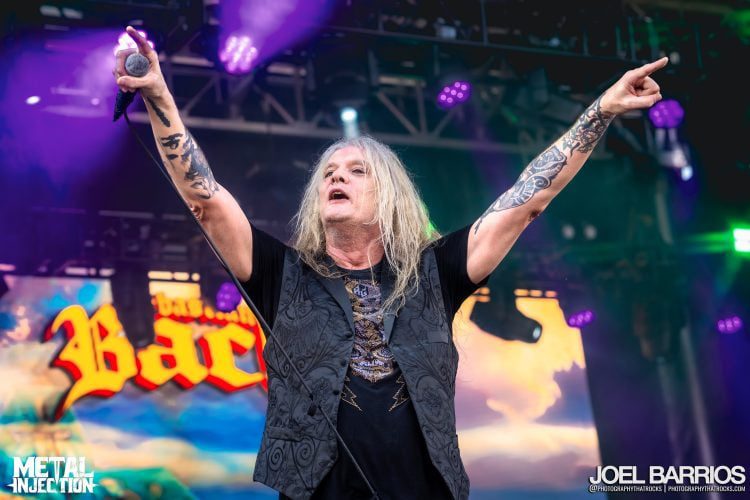
Closing the veteran trifecta, Bruce Dickinson transformed the Reverb Stage into a theater of heavy metal drama. In the midst of a massive U.S. tour, the Iron Maiden icon delivered the goods in his usual commanding and operatic fashion — albeit without the budget-busting extravagance that accompanies his main band. The light show and LED backdrop visuals were nothing to dismiss, but this performance thrived on music as its centerpiece. Heavy-hitting rockers like the recently minted “Resurrection Men” and the classic “Road To Hell” traded blows effectively with the epic “Book Of Thel” and the drawn-out ballad “Tears Of The Dragon.”
Yet even these gems were eclipsed by the roar that erupted when Iron Maiden’s deep cut “Flash Of The Blade” was unleashed, preceded by Dickinson delivering the first four verses of “Revelations” a cappella. Through it all, his voice rang loud and clear above the storm of sound, defying decades of wear from the road.
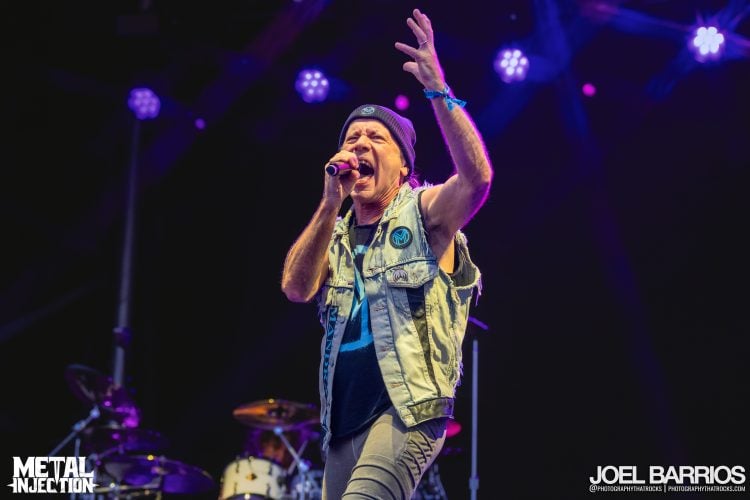
Anywhere else across the festival grounds, special moments were not in short supply. I Prevail dedicated “Hurricane” to their late former agent Dave Shapiro, a gesture that carried raw emotion for both band and fans. A Perfect Circle drummer Josh Freese made a surprise appearance sitting in with Stone Temple Pilots, merging two legacies on one stage. Evanescence invited 12 Stones frontman Paul McCoy—heralded for his original studio co-vocals on “Bring Me To Life”—to reprise his part live, while simultaneously livestreaming their full set to more than 13,000 fans around the world. And in a forward-looking highlight, Three Days Grace unveiled the live debut of their brand-new song “Kill Me Fast,” offering a taste of the next chapter in their catalog.
Each night carried the special excitement of a headlining set, and all delivered magnificently despite their stylistic differences. Thrash metal originators Slayer finally appeared after their prior year’s performance was canceled due to severe weather, and they gifted the masses with a punishing display only they could muster. The four horsemen of thrash returned to unleash chaos once more, performing before a crowd of frenzied devotees as though it were the last night they’d ever stand on a stage. They poured every ounce of fire into a set stacked with staples like “South Of Heaven,” “Disciple,” “War Ensemble,” “Dead Skin Mask,” and the rarely heard “213.” Crimson lights bathed the scene, chilling backdrops shifted in shades of blue, and explosions of pyro climbed 20 feet high, transforming the arena into an inferno of sound and flame.
Over 90 minutes and 20 songs, the mayhem escalated toward a final onslaught, detonating into fury with “Raining Blood,” which bled seamlessly into “Black Magic.” Inevitably, the closer came: “Angel Of Death.” That apocalyptic anthem — still the ultimate tribute to Jeff Hanneman’s genius — sealed the night in devastation, proof that Slayer’s macabre vision remains unmatched and eternal.
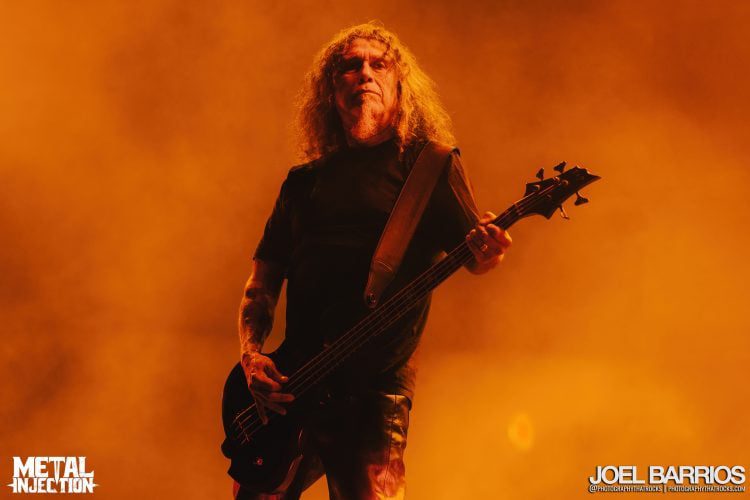
California’s millennial heavy metal sensation Avenged Sevenfold took command of the second night, performing to one of the largest audiences the festival has ever seen. Their melodic anthems arrived with a vengeance, the crowd roar becoming deafening even before the acoustic opening of “Game Over” gave way to the first power chord and subsequent thrashing barrage. Drummer Brooks Wackerman’s wild display was only upstaged by the formidable solos from Synyster Gates, particularly on “Afterlife” and the breakout hit “Bat Country,” the latter igniting some of the fiercest moshing of the weekend.
Even when the tempo slowed on songs like “Gunslinger” — introduced by M. Shadows as a deep cut that had recently found new life — and “Nobody,” the guitars often seized the spotlight whenever Shadows’ gravelly shouts and husky bellows paused for breath. Breath itself, however, was in short supply across the marathon set, with peak moments like “Nightmare,” “Buried Alive,” and “Cosmic,” a track from their most recent album that leaned into progressive rock territory, challenging fans both physically and mentally.
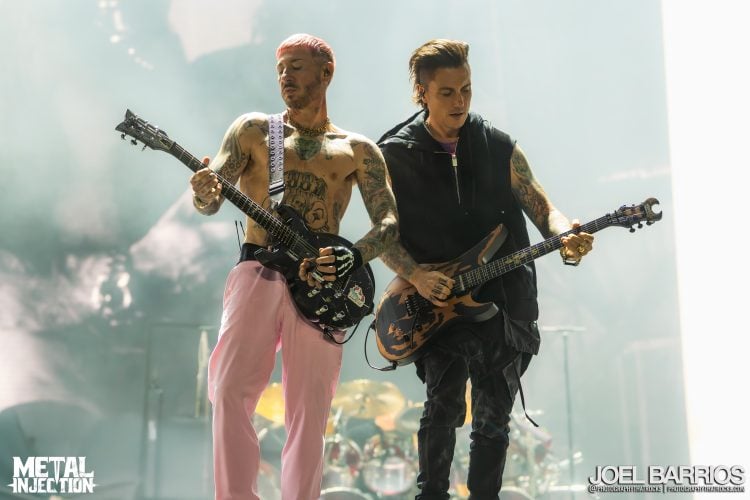
Nu-metal turned alternative/art rock stalwarts Deftones closed the third day with a sprawling 20-song journey. They spanned the full breadth of their more than 30-year career, from the hyped singles of their latest album Private Music — “My Mind Is A Mountain” and “Mild Of The Madonna” — to a ferocious rendition of their breakout mid-90s anthem “7 Words.” Seamlessly, they shifted between contrasting styles of modern rock and metal. Punchy tracks like “Swerve City” and “Hole In The Earth” established an atmospheric tension, reserving energy for the crushing impact of “Headup” and “My Own Summer (Shove It).”
At the center of it all, frontman Chino Moreno transitioned effortlessly between crooning and raging, flinging himself across the stage as the band flailed with reckless abandon. It was a performance both sprawling and intimate, a balance few bands can achieve.
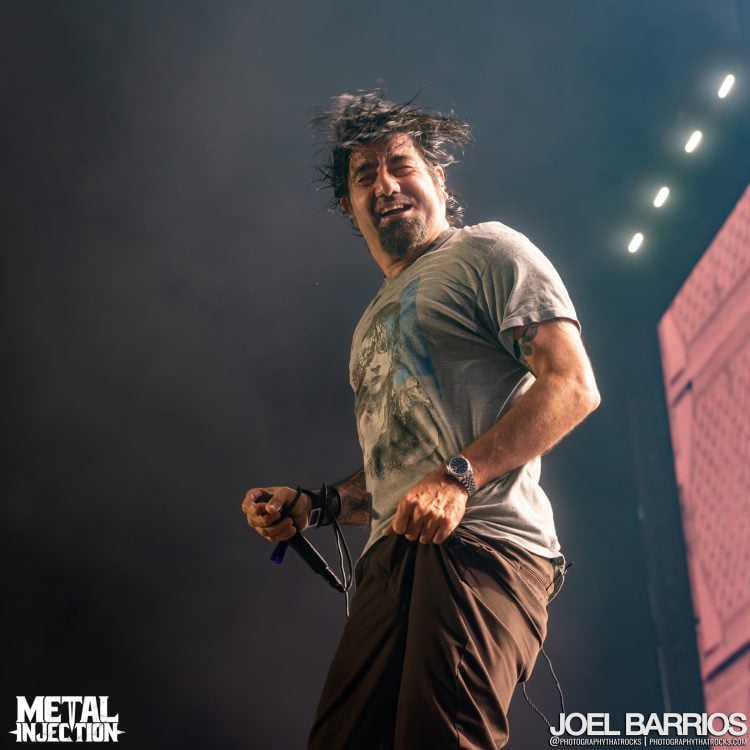
Finally, British metalcore veterans Bring Me The Horizon had the last word of the weekend, weaving their genre-bending catalog into a set that satisfied longtime followers and newcomers alike. They opened with the dark pulse of “DArkSide” before moving quickly through staples like “MANTRA,” “Happy Song,” and “Teardrops.” The pacing shifted deliberately, with heavy assaults punctuated by atmospheric pauses.
A surprise cover of Oasis’ “Wonderwall” sparked a massive singalong, while the live debut of “a bulleT w/ my namE On,” joined by Spencer Chamberlain of Underoath, became one of the festival’s most memorable moments. Fan participation reached its peak when a guest from the crowd was invited to scream the chorus of “Antivist,” underscoring the communal spirit that defined the set. Balanced against softer interludes and an acoustic rendition of “Follow You,” the night ended with a string of anthems — “LosT” and “Can You Feel My Heart” — sealing Louder Than Life 2025 with a mix of catharsis and celebration.
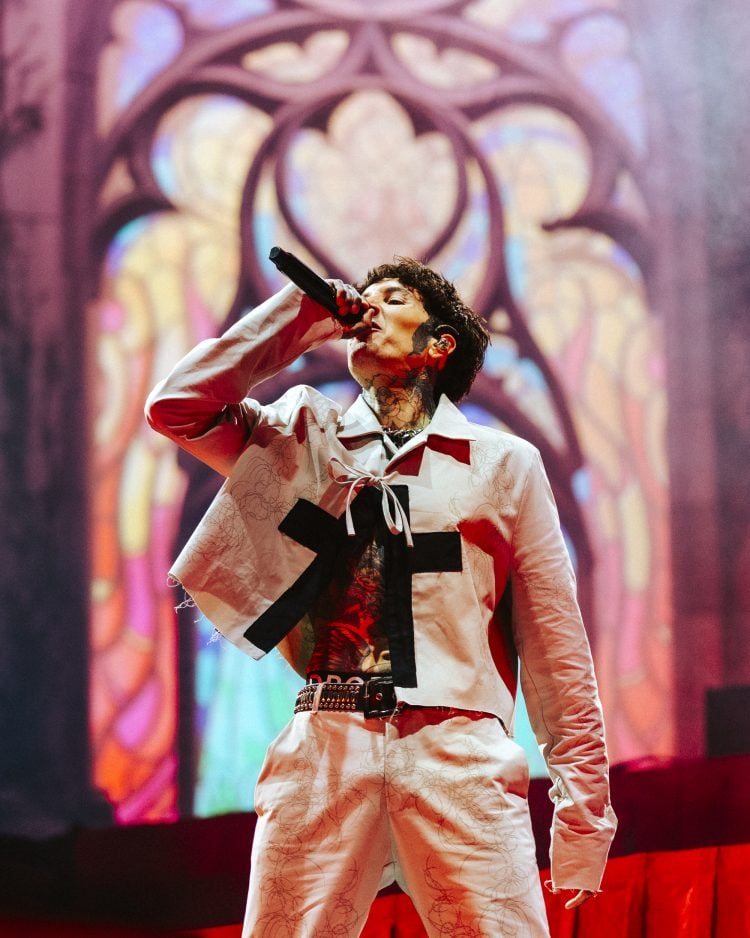
Louder Than Life 2025 roared back as the undisputed heavyweight of American rock festivals, taking over its new grounds with a scale and ferocity that felt unstoppable, and proving once again how far it has outgrown its own legend. Each new chapter raises its magnitude in an utterly uncompromising way — and this year, the dial broke clean off.






